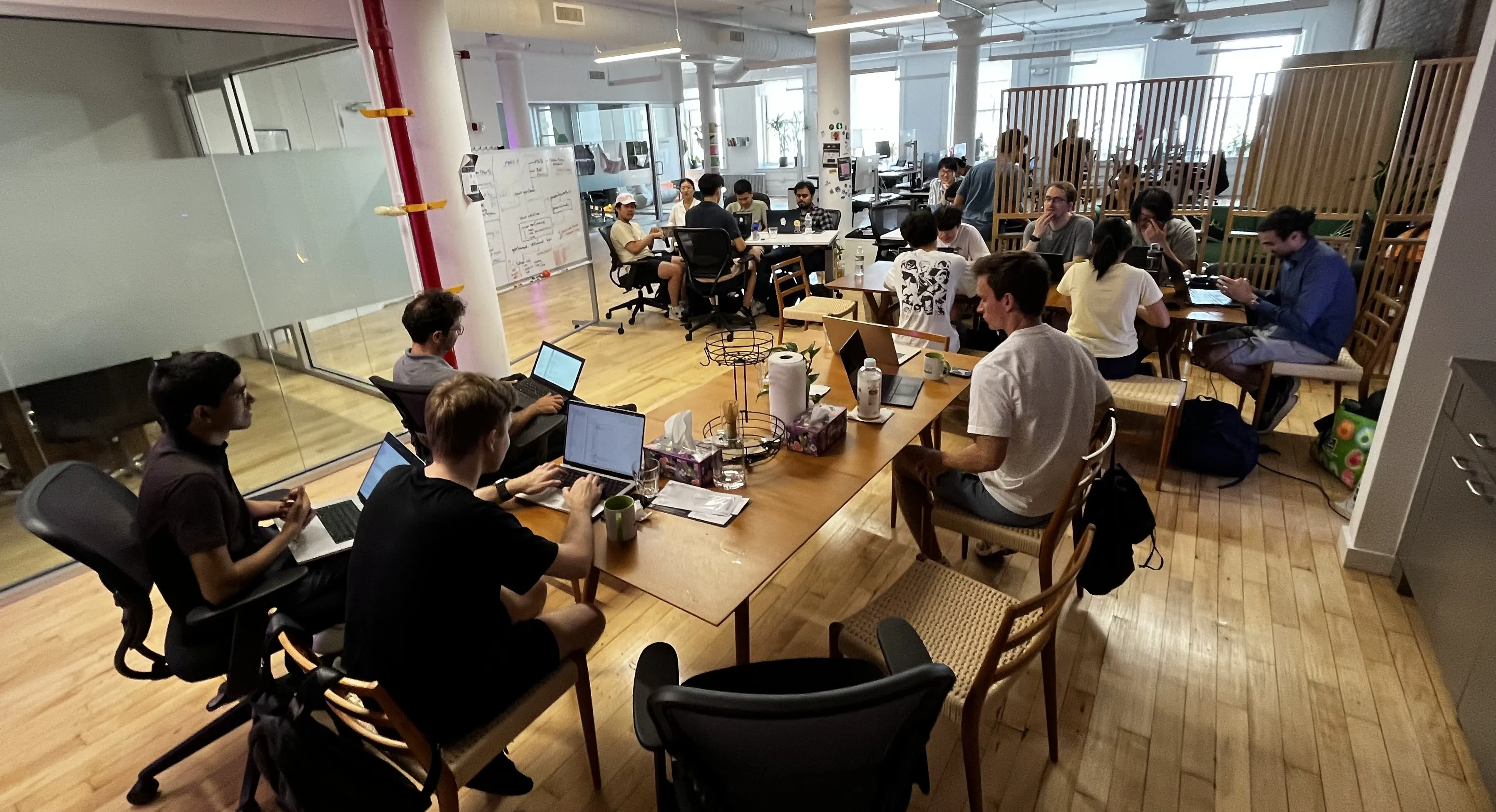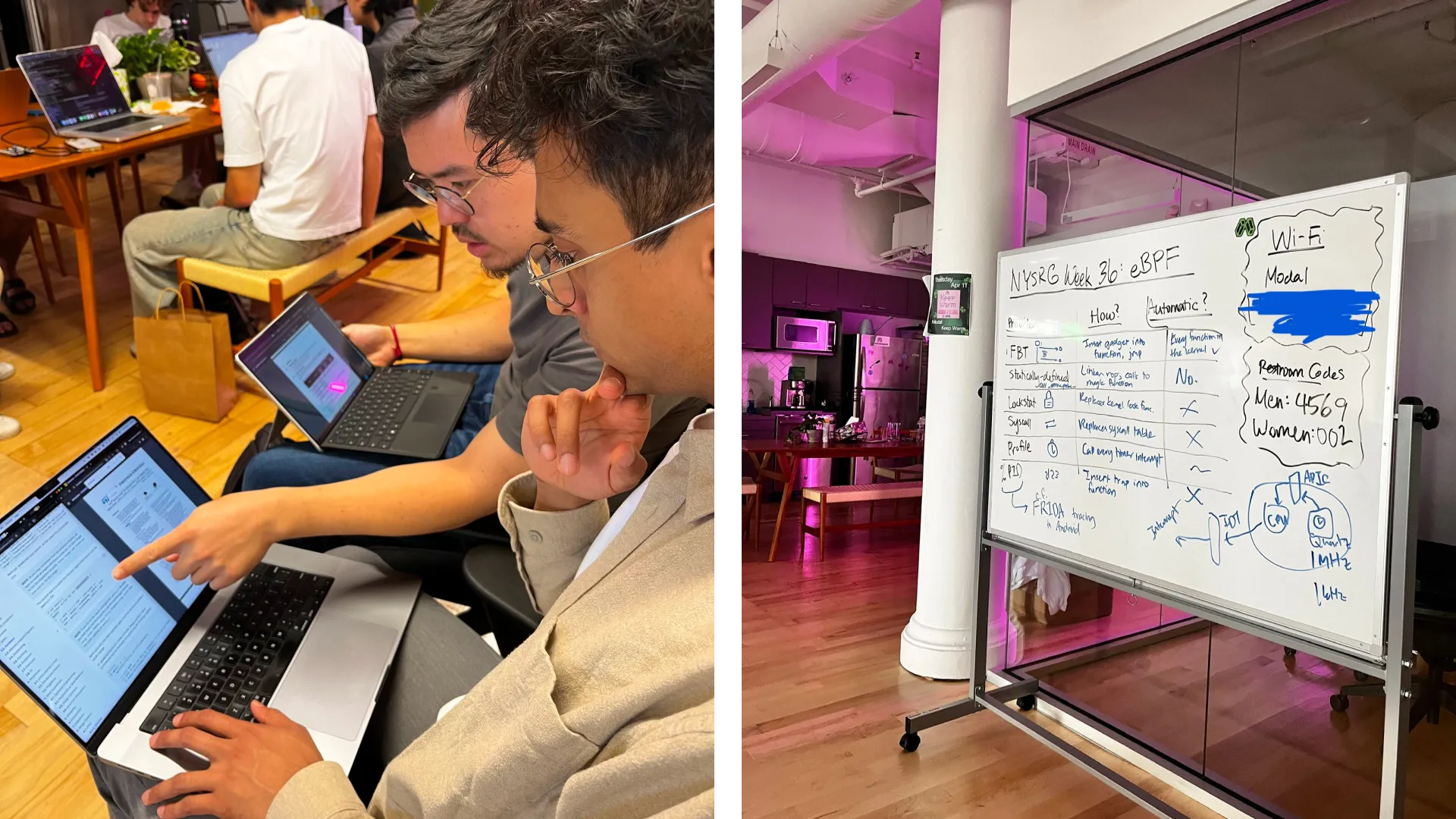NYSRG: The first year
A retrospective on learning in the heart of the city.
Eric Zhang•December 27, 2024
Last September, I started New York Systems Reading Group (NYSRG). A group of us would cram into a room somewhere in Manhattan every Sunday to learn. A simple idea: I read about computer systems a lot and wanted to do that with others, and I wanted to create a small niche in the city for people to read together and share a bit of community.
I met a lot of people through NYSRG, probably over 300 people over the course of these past 50 meetups, and we talked about a lot of things. (How does Bluetooth work? Redis? GPUs? Type theory?) Computers are cool artifacts, they were created by people for people, and they’re worth understanding.

NYSRG is open to everyone. No prerequisites, no gatekeeping — just a bunch of curious people willing to dive into the guts of build systems, database internals, zstd compression, and whatever else caught our interest. Sometimes the room was packed; other times, it was just a handful of us. Either way, the vibe was nice: energetic, collaborative, and genuinely welcoming.
It’s incredible how easy it is to make friends when people gather with a shared interest. I really felt like part of the city in a unique way after moving here, in the sense of “you get out what you put in” for communities.
After a year of organizing this weekly meetup though, I’m ready to experiment with changing up the format a bit. Would like to think through some of the reasoning here and what I’ve learned along the way.
A modern discussion forum
It wasn’t originally meant to be a long-term thing. I started running “systems reading group” at Harvard in 2022 as a student, and we found the format over time by iterating on what a learning community should look like. Let’s optimize for connection and fun. There are a couple things I learned from 2 years of organizing modern reading groups:
- You can learn almost anything online. At least for topics in computer science, you don’t have to be an expert. There are lots of breadth because computers are everywhere, and you can learn a bit about so many different topics without needing a PhD in a specific subfield. (This is also why ML research is so decentralized, for example — anyone sufficiently motivated is able to contribute!)
- Traditional reading groups are for networking among experts. The academic “colloquium” format: join the group, pick a set of papers, and then read them each week. Someone presents each paper. Sometimes we invite the authors. I think this is lacking in several ways: you need to be an expert in a field, and it’s often about scientists coming to advertise their own research area. No one actually reads the papers ahead of time.
Traditional reading groups are fine in traditional academic settings, but in modern times, anyone can learn. If you want to start a community for people to learn from all backgrounds, I think you should read together during the group session — it’s more fun! And you should focus on learning from other curious individuals similar to you, rather than inviting experts.
Very few working professionals want to go to a synchronous lecture every weekend. It’s much more efficient to read a book, a paper, or watch talks. Instead of having lectures, the joy of gathering is that you can discuss and learn from understanding other people’s perspectives.
You can understand computers (aside)
As a digression: Computer science gets a reputation for being tricky material. Especially theory and systems topics like databases, formal verification, compilers, distributed algorithms, and OS. People think they’re not smart enough.
But I am a self-taught programmer, as are many others.
I’d argue that if computers and systems are all around you, you should be able to understand them. Think about it: everyone uses digital systems, and they are designed and changed from around the world, with tutorials scattered in a hundred million different YouTube videos, sites, forums, and wikis across the Internet. This universality demands that computers become grokkable by anyone, not just experts.
NYSRG’s existence is a statement that yes, a group of motivated people can indeed understand the world. It’s not so complex. We didn’t invite famous speakers! We’re not experts, and we discovered that we can learn anyway — having a weekly gathering is just the catalyst.

This is another core belief I have: you can learn something from everyone. Not just experts. Listen to people because they have unique backgrounds and perspectives, they experience their own little slice of the world. Computers are ultimately for people; technology is everywhere, and I think to be a good technologist, you ought to understand the people whose interests you serve. It starts by listening.
What comes next
Week 50 of NYSRG will be the final week under the current format.
I’m thinking about new formats.
For systems topics, more focused, short-term events: ad hoc sessions, maybe quarterly gatherings, or projects like “Four weeks to write a differentiable renderer together.” Small groups, but with more depth. Hybrid virtual-physical setups across the week could also be interesting for flexibility.
But I’m also itching to try things outside of systems. Design critiques, project showcases, gatherings where people share what they’re working on or what they care about. Less rigid schedules, more space for organic connections. It’s a shift to something a little more tuned and intentional. I’ve learned that while you can learn a lot of breadth in topics on a weekly short-term engagements, it doesn’t offer you a lot of time to think deeply about one specific thing. And a lot of learning comes from that creative process.
In 2025, I want to start with a monthly topic. As we ease in, we can still have weekly meetings, but I’d like to encourage more small project work. It will be for people to develop and share new ideas over the course of a month, rather than only reading. To make the most of meetings, we can explore in small groups. People can also collaborate virtually on Discord between meetings. We’ll have presentations, and a bit of reading still (especially near the beginning of the month).
How does that sound as a rough idea? Perhaps not everyone is ready to commit every month, but they can still come and learn; presenting your work isn’t mandatory. (I know this is pretty vague right now, but we’ll figure out the details as we go. That’s in the spirit of the group too. :D)
In any case, I’m excited to try it out. If reading is something I love doing with others, creating work together should be as well.
I have some people to thank.
Thanks to my employer Modal for the office space where we meet. For the first six months, we had rented out a tiny room for $50+/hr in Manhattan and all chipped in to share the cost. Now we don’t have to do that anymore.
I’m grateful for a lot of people who made systems reading group happen over the past year or two. To Asher, Janabel, Hao, Conrad, Nathan, Val, Fang, Bryan, Joel, Greg, Amy, Ori, Rene, Mufeez, Rama, Raghav, Aizk, Abel, and many others: thanks for coming by.
Let’s find a place to learn together.